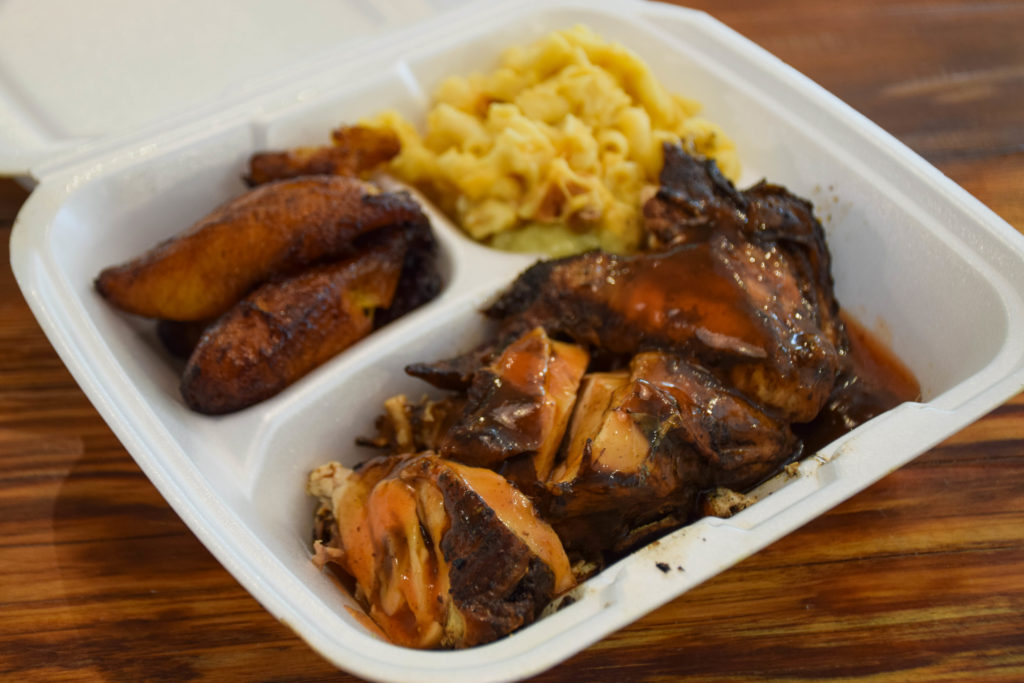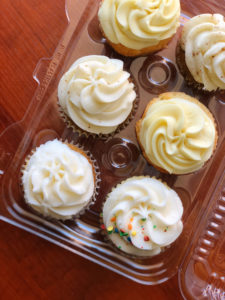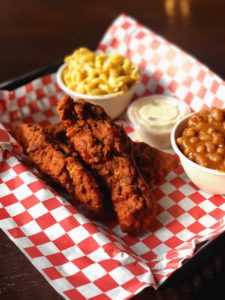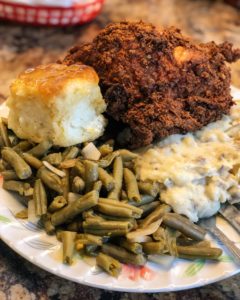
Reporter’s note: Hey, Rachel here. We featured this article in the NashVillager on Feb. 2, 2024. It’d been a minute (or 1,924,667 to be exact), so I’ve since updated the list to remove the couple dozen businesses that have unfortunately closed since 2020 (RIP Dandgure’s) and added a few new ones.
Recent protests have put black-owned businesses in the spotlight, and it comes at a pivotal time — just as they begin reopening after the coronavirus closed down much of Nashville for several weeks.
WPLN News compiled the more than 100 locations and spoke to six restaurant owners about their business and these times.
Find a full list of Nashville’s black-owned food establishments at the bottom of this post, including those businesses that couldn’t be mapped (such as food trucks, caterers and at-home bakeries). Did we miss a spot? Email us.
Riddim N Spice
Interview with Rashean Conaway, co-owner (along with his brother, Chef Kamal Kalokoh). Established in 2014 as a food truck and 2019 as a brick-and-mortar.
How did you start your business?
“My brother became Drake’s personal chef, and he needed some help on the backend as far as routing and making sure the whole tour catering thing went smoothly. So, that’s how I jumped on board. And after we did a couple of tours, he was actually Rihanna’s personal chef for a little bit. After going around the country, we realized there’s not a lot of options as far as Caribbean food, where it’s approachable and people aren’t daunted by the menu. So that’s how we started the idea of Riddim N Spice.”
What’s your favorite thing on your menu?
“The smoked jerk chicken. My brother is pretty good at replicating how to smoke jerk chicken in the way that it is in Jamaica. People in this country assume that jerk chicken is really spicy, when it really is not in the process that it’s cooked.”
Are there any specific challenges you face as a black-owned business?
“Definitely. We were planning on opening up in Five Points in East Nashville. We had a food truck over there. We had a long-term lease. We parked the food truck over there, and the reception was extremely interesting. We believe in art. We would have local artists do murals on the wall, but — I’ll be frank with you — white people would be afraid to approach the truck, but they would want to take selfies with the mural. It’s disrespectful, and it makes you feel a certain type of way. So I think things happen for a reason, and it’s a blessing we have this opportunity in North Nashville.”
What do you see the role of black business owners in the current racial climate?
“On one hand, I’m a black man. On the other hand, I’m a business owner. Prior to all of what’s occurred in the last week, we talked all the time throughout Nashville. We’re friends with the guys who run Slim & Husky’s and all the other businesses, and I don’t know how to take the increase in our sales. But I just wish people had been more aware of black-owned businesses — that we are here, that we provide great service and products. A tragedy like what has occurred — it should not have caused this to occur, this uptick in business.”
— Rachel Iacovone
The Cupcake Collection
Interview with owner Mignon Francois. Established in 2008
 Rachel Iacovone WPLN News
Rachel Iacovone WPLN NewsA variety of cupcakes from the Cupcake Collection, including sweet potato, sweet lemon, wedding cake and birthday cake.
How did you start your business?
“Out of hunger and desperation. I started the Cupcake Collection because I was hungry. I was sick and tired of being sick and tired. And, I just prayed to God, and I heard God say to me, ‘Are you willing to do what he does to get what he has?’ And, as I looked at the people that represented success — wild success — to me, I knew they worked really hard to get there. So, I was willing to put in the work, and that’s what I did.”
What’s your favorite thing on your menu?
“I’m so proud of our sweet potato cupcake. It is my favorite thing on the menu. It was voted by Yelp and Business Insider as the best cupcake in Tennessee, and it’s quickly make putting us on the map nationally. When we first introduced the sweet potato cupcake, people were shocked. But we are really proud to say if you ever meet another sweet potato cupcake in the world, it wants to be this one. This was speaking back to our Southern heritage. My sisters and I recently got a chance to go back to the town in Louisiana where our maiden name hails from. And as we were standing in the middle of town, where there was only a stop sign, we found ourselves in the middle of a sugarcane field. And, when you look at the road and know what kind of people paved the way for you to be who you are, it humbles you. And, it also makes you realize that you indeed are your ancestors’ wildest dreams.”
Are there any specific challenges you face as a black-owned business?
“What the Cupcake Collection desires to be is a lighthouse in the community, to show other people what good business should look like and to light the path for other entrepreneurs to know what they can do if they believe. I was everything you were supposed to do to fail in business. I was a teenage mother. I had dropped out of college. I have since gone back, and now I sit on the board in the school of business at Lipscomb. Now, I’m helping to keep my foot in the door for people who want to follow in my footsteps. If I face any specific challenges, it’s because I don’t have a rich, long legacy of people to look back on in my family and say, ‘My grandfather did it this way, and my great-grandfather did it this way,’ and to leave for me that trail of crumbs of how you do business. And so, it is my particular goal in life to leave those crumbs for the people who are in my neighborhood, my community, my circle, my reach, to be able to say, ‘This is the way you do it.'”
— Rachel Iacovone
The Southern V
Interview with Clifton Hancock, co-owner along with his wife Tiffany Hancock. Established in 2015.
 Rachel Iacovone WPLN News
Rachel Iacovone WPLN NewsAn order of the Southern V’s hot vegan chicken with a side of plant-based macaroni and cheese and baked beans
How did you start your business?
“Back when our first daughter was born, she had some intolerances to dairy, and since my wife was real breastfeeding at that time, of course, what she consumed the child received. So, that’s when we started our vegan lifestyle. And going out, there were some options, but nothing like we were used to eating because we are from the South. So, my wife decided to go into the kitchen with some of the recipes that she had in mind — things that she got from her grandmother and her mother. And she just started creating these dishes.”
What’s your favorite thing on your menu?
“Mine would have to be the ‘snausage’ biscuit that we have. It’s our vegan version of a sausage biscuit. Tiffany would definitely choose one of our staple dishes, our Nashville hot fried chicken. It’s seitan that we make in house, and it’s battered and it’s fried in palm oil. It’s then seasoned and spiced up with a little bit of Nashville’s tradition. She is more so on the spice in anything.”
Are there any specific challenges you face as a black-owned business?
“Being a black business owner, sometimes there are some stereotypes that you must kind of compete against that a lot of times are very untrue. But if they are, it’s not only a black-owned business that you would experience that with. One of them could be poor service. Poor service can be provided, no matter what ethnicity you are. But people may come in with already preconceived ideas of what experience they may have.”
What do you see the role of black business owners in the current racial climate?
“The best way I can say it is I would love for us as a country, as a community, as a people to at some point get to where we’re just seen as a business. I think at this time business owners, especially black business owners, need to just continue doing what they can for their communities, continue doing what they can to keep their doors open. I hope that everyone takes this opportunity to continue to support each other. Don’t take this as just a hashtag or a T-shirt moment in time.”
— Rachel Iacovone
Big Al’s Deli
Interview with Alfonso Anderson Jr., owner. Established in 2013.
 Rachel Iacovone WPLN News
Rachel Iacovone WPLN NewsFried chicken, mashed potatoes, green beans and a butter-basted biscuit at Big Al’s Deli
How has the coronavirus pandemic impacted your business?
“It’s been horrible. In the restaurant business, you know you have to have a cash flow going. And, once your cash flow stops, everything stops. I got hit with a tornado before the virus. So, basically, I haven’t been really up and running since the end of February. And when you’re down 75% in sales, it’s very hard to keep things going. At this point, I’m trying to have enough money to pay the bills and pay my help until it gets better. My biggest concern is location. I’ve been told by a few marketing companies, ‘You have an F location. We just don’t understand how you’re still in business.’ Usually for longevity, you have to be in a very great location. I feel the virus more now because people aren’t getting out. You don’t just stumble upon Big Al’s Deli you’re coming there for a reason. So, it’s been rough.”
Were there any unexpected benefits?
“The love of some of my customers. I’m a devout Christian. And, you know, I don’t play about my faith. I had a church that I’ve never visited use me for catering a couple times last year. Well, the pastor called me and said, ‘We need to order some catering from you because we want to make sure you stay in business.’ Now, you know, I’m not an emotional man, but I almost cried. So, they say, ‘And we will not take you cutting us a deal or anything. Charge us what you would’ve charged.” So, I charged them. When they went to pay, they had a check for me that was three and a half times what I had charged them. And, he said, ‘We want you to stay in business because North Nashville needs Big Al’s Deli.’”
What is your favorite thing on your menu?
“My favorite thing is whatever the customer likes. My menu is what the customers have liked.”
— Ambriehl Crutchfield
Bone’s Fish and More
Interview with Jaryn Bone, co-owner. Established in 2007.
What’s your favorite thing on your menu?
“Oh, it has to be our fried fish. We serve three types of fish, but our catfish is my favorite. That’s our No. 1 seller.”
Are there any specific challenges you face as a black-owned business?
“My dad started this business completely with his own funds, no outside funding through any bank or any loan company. And, he definitely tried to get those loans and stuff like that, but no one wanted to help us. So, he went and did it on his own, which is definitely something that I’ve noticed with a lot of black business owners. We fund the lack of funding that, you know, the other businesses may have, and that can definitely be a challenge.”
What do you see the role of black business owners in the current racial climate?
“I think it’s just important. We see the importance of us. You know, I feel like when another black man sees another black man do it, he believes that he can. We have to push our businesses. We have to support our businesses. We have to support our people. That’s just what it all it’s about.”
— Ambriehl Crutchfield
Coneheads
Interview with Marcus Bugg, owner. Established in 2019.
How did you start your business?
“I kind of got into cooking in restaurants via my mother. My mother owns a restaurant in Madison, Tenn., called Cal’s Country Kitchen, and she’s been there for 23 years. About four years ago, my wife and I started a catering company. We were getting a lot of requests for brunches and things like that. People want chicken and waffles, and in Nashville, everybody has a chicken and waffles on their menu. So, we were looking for just a different way to present it, to differentiate ourselves.”
Were there any unexpected benefits of the coronavirus for your business?
“It helped me see what things were most important and what things weren’t important because, you know, when the business slows down like this, you kind of start looking for areas to trim the fat and cut costs. If anything, working during quarantine made us more efficient.”
What do you see the role of black business owners being in the current racial climate?
“I think our role was playing the same role that we’ve always played. We’re out showing people that we can do things and to not discredit us just because of the color of our skin. I think a lot of people’s eyes are being opened to black businesses around Nashville in particular. There’s a lot of creativity and innovation around here that people — in general, white people — may not see on an everyday basis because that’s not a part of their everyday life or what they’re used to. And, I’m black every day. It’s not something that I’m ashamed of by any stretch of the imagination. Just like anybody else, I want to be treated fairly and treated right. I hope people expect the same from me.”

